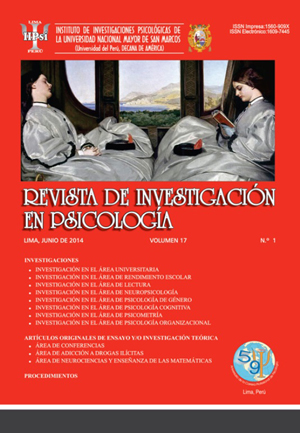Lenguaje oral y habilidades prelectoras en niños de 4 a 6 años. Un estudio sobre marginalidad y bilingüismo en el Perú
DOI:
https://doi.org/10.15381/rinvp.v17i1.8974Palabras clave:
marginalidad, bilingüismo, lenguaje oral, conciencia fonológica, habilidades prelectorasResumen
El estudio buscó determinar si la condición de marginalidad y el bilingüismo pueden estar afectando el desarrollo lingüístico oral y las habilidades prelectoras en niños de 4 a 6 años en tres zonas del Perú y, asimismo, establecer si el desarrollo de los componentes fonológicos, morfosintácticos y semánticos del lenguaje oral tiene relación con la conciencia fonológica, memoria verbal de corto plazo y otras habilidades prelectoras. Para ello, se examinó a niños de educación inicial de zonas urbanas: Lima y Ate-Vitarte, y zonas rurales: monolingüe castellano en Cajamarca y bilingüe en Huancavelica, con el test breve de bilingüismo (Escobar 1978, González 2006), la Prueba ELO, de Ramos (2008), y la prueba BIL 3-6 (batería de inicio a la lectura), de Sellés (2008). Los resultados mostraron diferencias significativas en el desarrollo lingüístico oral entre los grupos, a favor de niños de zonas urbanas. Los niños en condición de marginalidad rural- bilingüe, Huancavelica- Quintaojo, y en segundo término, los niños de Cajamarca- Huayobamba, obtienen los más bajos rendimientos. Un resultado similar se aprecia en lo que respecta a las habilidades prelectoras. Se halló correlación significativa entre el nivel de desarrollo de los diversos aspectos del lenguaje oral y las habilidades prelectoras.Descargas
Publicado
Número
Sección
Licencia
Derechos de autor 2014 Ricardo Canales Gabriel

Esta obra está bajo una licencia internacional Creative Commons Atribución-NoComercial-CompartirIgual 4.0.
LOS AUTORES RETIENEN SUS DERECHOS:
a. Los autores retienen sus derechos de marca y patente, y tambien sobre cualquier proceso o procedimiento descrito en el artículo.
b. Los autores retienen el derecho de compartir, copiar, distribuir, ejecutar y comunicar públicamente el articulo publicado en la Revista de Investigación en Psicología (por ejemplo, colocarlo en un repositorio institucional o publicarlo en un libro), con un reconocimiento de su publicación inicial en la Revista de Investigación en Psicología.
c. Los autores retienen el derecho a hacer una posterior publicación de su trabajo, de utilizar el artículo o cualquier parte de aquel (por ejemplo: una compilación de sus trabajos, notas para conferencias, tesis, o para un libro), siempre que indiquen la fuente de publicación (autores del trabajo, revista, volumen, numero y fecha).






